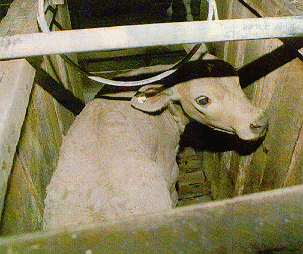Q: Why can't this veal calf walk?
A: He has only two feet. |
||
| Actually, less than two feet. Twenty two
inches to be exact. His entire life is spent chained in a wooden box measuring
only 22 inches wide and 56 inches long. The box is so small the calf
can't walk or even turn around.
Most people think animal abuse is illegal. It isn't. In veal factories, it's business as usual. "Milk-fed" veal is obtained by making a calf anemic. The calf is not fed mother's milk. He's fed an antibiotic laced formula that causes severe diarrhea. He must lie in his own excrement — choking on the ammonia gases. He's chained in a darkened building with hundreds of other baby calves suffering the same fate. They are immobilized, sick, and anemic. Toxic Veal The reckless use of oxytetracycline, mold inhibiting chemicals, chloramphenicol, neomycin, penicillin, and other drugs is not just bad for calves. It is toxic to you. But doesn't the USDA prevent tainted veal from being sold? Absolutely not. The USDA itself admits that most veal is never checked for toxic residue. Antibiotics in veal and other factory farm products create virulent strains of bacteria that wreak havoc on human health. Salmonella poisoning is reaching epidemic proportions. Veal factories maximize profits for agribusiness drug companies |
because they are a breeding
ground for disease. To keep calves alive under such torturous conditions,
They are continually given drugs which can be passed on to customers.
It doesn't have to be this way. And with your help, it won't be.
Please, don't buy veal!
|
|